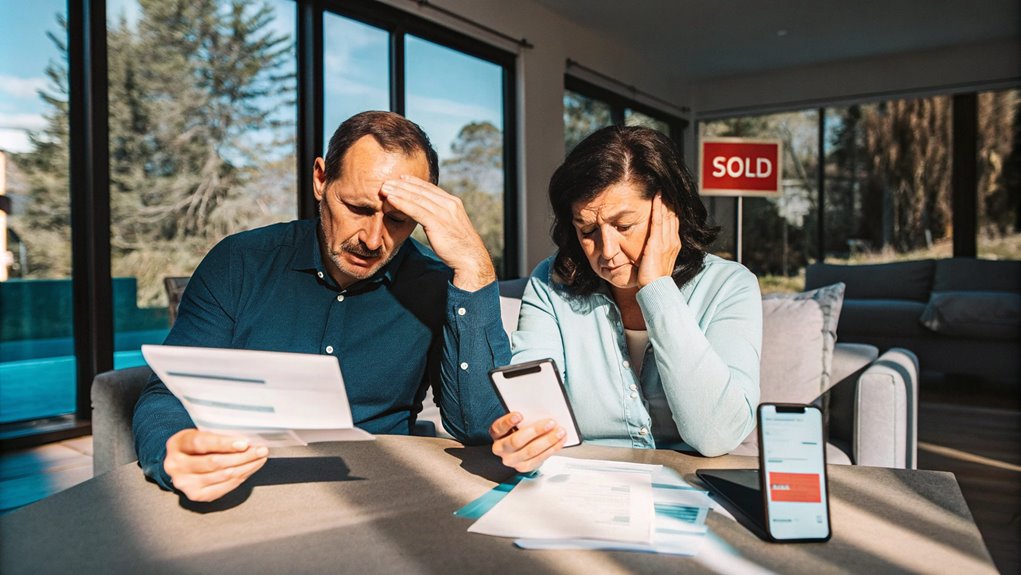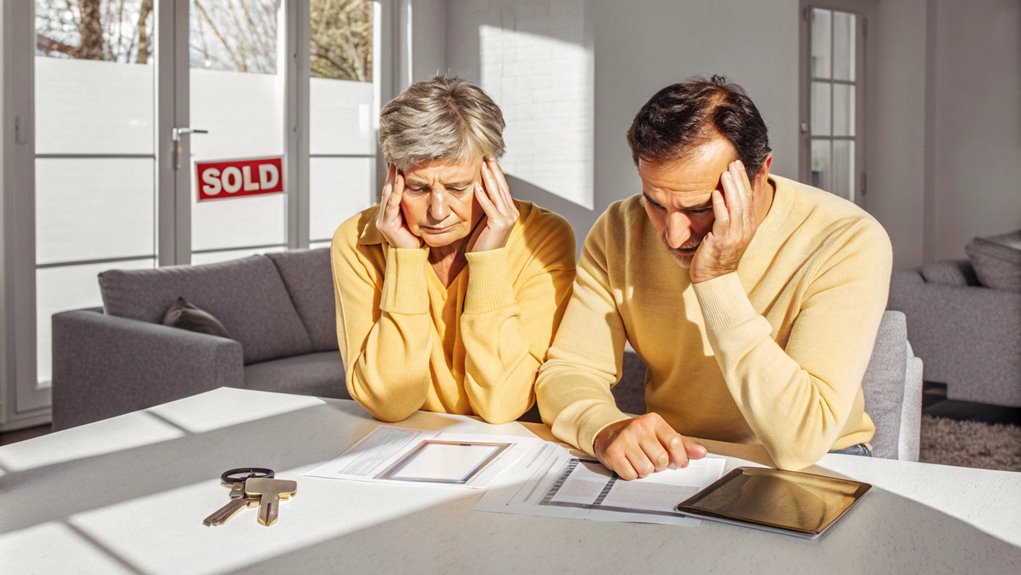Having no mortgage might sound great, but it's not always the best choice for your money. When you pay off your home, you lose some tax breaks that save you money each year. Plus, your money gets stuck in your house instead of growing in other ways. Think about this: If you put $10,000 in stocks, it could grow to $67,275 in 20 years. But using that same money to pay off your house only saves you $21,911. You also need to keep extra money in the bank for big bills since getting cash from your house takes a long time. Before you rush to pay off your home, think about what's best for you and your family's needs.
Ready to start building equity in your own Michigan home? Get your personalized home loan quote today.
Tax Deductions Lost Forever

When you finish paying your home loan, you lose a tax break. You can't take off the loan interest from your taxes anymore. This means you might pay more in taxes each year.
But don't worry! You can still save on taxes in other ways. You can put more money in your retirement savings. You can give money to good causes.
If you run your own business, you can write off some costs. You can also buy special bonds that don't get taxed, or be smart about how you sell your stocks.
Think of it like finding a new path when your old one is gone. There are lots of ways to keep more of your money safe from taxes.
Michigan residents, unlock the door to your new home. Request your home loan quote from Treeside Financial today.
Opportunity Cost of Tied Funds
Having all your money locked in your home is like keeping your toys in one box. You might miss chances to make your money grow in other ways.
Think of it like this: if you put $100 in a piggy bank, it stays $100. But if you put that money in other places, like the stock market, it could grow bigger over time.
Many smart people keep some money in their homes and put the rest in different spots. This is like not putting all your eggs in one basket. They can grow their money better this way.
You could use the money to:
- Save for when you get old
- Start your own small shop
- Buy other houses to rent out
This helps your money work harder for you than just sitting in your house.
Emergency Liquidity Constraints

When you own your home without a mortgage, you might think all your money worries are gone.
But having all your money locked up in your house can be risky.
If you need cash fast, you can't just pull money from your walls!
You might think about getting a loan against your house.
But banks don't always say yes when times are tough. They might say no if you lose your job or have money problems.
The smart thing is to keep some cash in a bank account.
Try to save enough money to cover 3-6 months of bills.
This way, you can handle big surprise costs without touching your house money.
Your savings will be there when you need it most.
Investment Growth Potential Sacrificed
If you pay off your house early, you miss chances to grow your money more.
Think of it like having two piggy banks. One is your house, and one is for stocks. The stocks piggy bank usually grows your money faster than what you pay on your house loan.
When you put all your money in your house, it's like putting all your eggs in one basket. You might end up with more money if you keep paying your house loan slowly and put extra cash in different places to grow.
Missed Market Returns
When you pay off your house loan early, you might lose money in a different way.
Think of it like this: you could put extra money into your house payments, or you could put that money into stocks that could grow bigger over time.
Let's say your house loan costs you 4% each year. But if you put money in the stock market, you might earn 10% each year. That means you could make 6% more by picking stocks over paying your house loan early.
Here's a simple way to see it: If you put $10,000 in stocks and wait 20 years, it could grow to $67,275.
But if you use that same $10,000 to pay off your house loan early, you'd only save $21,911. That's a big difference in how much money you end up with!
Lower Portfolio Diversification
Having a home is great, but paying it off too fast can be risky. Think of it like putting all your money in one place – your house. This could hurt you if house prices drop in your area.
It's smart to put your money in different places. You can buy some stocks and bonds. You can also save some cash. This way, if one thing goes down, you still have other money safe.
If you need help, talk to someone who knows about money. They can show you the best way to use your money.
If your house is paid off, you can use that money to buy other things that make your money grow. You can even get a loan based on what your house is worth.
Inflation's Hidden Impact

Your home is like a big piggy bank. Even when you fully own it, its value mightn't grow as fast as things get more expensive.
Think of it like this: the money in your piggy bank stays the same, but candy at the store costs more each year.
To keep your money strong, you may need to put some of it in other places too – like a garden that grows more food or stocks that earn more money over time.
Purchasing Power Erodes Away
When you finally pay off your home, it feels great! But there's a sneaky problem called inflation.
Think of it like this: The same ice cream cone that cost one dollar when you were a kid now costs five dollars.
The same thing happens with houses. Your $200,000 house from twenty years ago would cost much more to buy today. This means the money you saved isn't worth as much as you thought.
Many people face this same issue. But you can fight back! Here are some simple ways to keep your home's value strong:
- Put money in different places, not just your house
- Fix up your home to make it worth more
- Rent out a room to make extra money
These simple steps can help your house stay worth a lot of money over time. This way, you won't lose out to rising prices.
Fixed Assets Lose Value
Your house might seem safe because you own it fully. But even paid-off homes can lose their real worth over time.
Think of a $400,000 house you bought in 2020. Each year, it goes up a bit in price. But when you look at what that money can buy, it buys less and less.
| Year | House Price | What It Can Really Buy |
|---|---|---|
| 2020 | $400,000 | $400,000 |
| 2021 | $412,000 | $385,200 |
| 2022 | $424,360 | $371,143 |
| 2023 | $437,091 | $357,775 |
| 2024 | $450,204 | $345,063 |
Your house is like a big piggy bank that slowly leaks money. The number on the price tag grows, but its real worth drops. To keep your money strong, put some in other places too. Look for ways to grow your money faster than prices go up.
Market Returns Vs Mortgage Rates
Think about this: your house loan is like a fixed monthly bill. You know exactly what you need to pay each month.
But when you put money in stocks, it's more like a roller coaster ride – sometimes up, sometimes down.
Most times, money in stocks grows faster than what you pay for your house loan. Let's say you pay 4% on your house loan. The stock market often grows by 8% or more each year.
This means you could make more money by putting extra cash in stocks instead of paying off your house early.
Still, there's a catch. No one can tell you for sure how much money you'll make in stocks. Your house loan stays the same – that's something you can count on.
Many smart people keep paying their house loan as planned. They put their extra money in special savings accounts that help them pay less taxes.
This helps their money grow bigger over time.
Portfolio Diversification Challenges

Having a paid-off home can make it tricky to keep your money spread out well.
Think of it like putting too many eggs in one basket. Your house becomes a big chunk of what you own, but you can't quickly turn it into cash when you need it.
Let's say your house is worth half of all the money and things you own. That's a lot! To fix this, you need to be smart with the rest of your money.
You might put more money in stocks or bonds to balance things out. You could also get a special loan that uses your house as backup, just in case you need quick cash.
Remember: Your home is great to own, but don't let it be the only big thing you have.
Keep some money in other places too, so you stay safe and ready for anything.
Debt as Financial Leverage
Having no house debt feels good, but it's worth thinking about. When you pay off your house, you lose a helpful money tool. Smart money people sometimes borrow to make more money grow faster.
You can borrow money in different ways:
- Using your house value
- Getting cash from your house
- Taking out personal loans
- Getting business loans
- Buying houses to rent out
Each way has its own risks and rewards. Some are safer than others. Some can make more money than others.
Think about what you want. Do you want to stay debt-free? Or do you want to try to make more money by borrowing? Talk to a money helper to find what's best for you.
| How to Borrow | How Risky | How Much You Could Make |
|---|---|---|
| House Value Line | Some Risk | 8-12% |
| House Cash Out | More Risk | 10-15% |
| Personal Loans | High Risk | 12-20% |
| Business Loans | Very High Risk | 15-25% |
| Rental House | Some Risk | 8-14% |
Cash Flow Management Options

Once you finish paying for your home, you need to make a choice.
You can save more money in your emergency fund.
Or you can get a HELOC, which lets you borrow money using your home's value.
You can take the money you were using for house payments and put it into things that might grow more, like stocks.
Think about what feels safe to you.
Remember that stocks can go up and down, but your home's value is more stable.
Accessing Home Equity Fast
Getting money from your home's worth can help when you need cash fast. Let's look at how you can do this.
Think of your house like a piggy bank. You can break into it in three ways:
A HELOC works like a credit card for your house. You can get it in about 2-4 weeks. You take money when you need it and pay it back over time.
A cash-out loan takes longer – about a month to six weeks. But you get all your money at once, and you might pay less in the long run.
A home loan is the fastest way. You can get your money in two weeks. The rate stays the same the whole time.
Smart tip: Set up one of these before you need it. This way, you won't have to wait when you really need money fast.
Monthly Payment Vs Investment
When you finish paying for your home, you can use the extra money in new ways.
Think of it like having more coins in your piggy bank each month.
You have two simple choices:
- Save your money in the bank
- Put your money to work by investing it
If you save your money in the bank:
- You can get it quickly when you need it
- The bank will pay you a little bit for keeping it there
- It's very safe
If you invest your money:
- It can grow bigger over time
- You might earn more than keeping it in the bank
- It comes with some risks
Some people like to do both.
They save some money in the bank and invest some too. This is like not putting all your eggs in one basket.
What you pick depends on:
- How old you are
- How careful you want to be with money
- What you want to do with your money later
Emergency Fund Vs Mortgage
Having money saved for when things go wrong is still important after you pay off your house. But now you can save less since you don't have a house payment anymore.
Try to keep enough money in your savings to cover your bills for 3-6 months. Since your house is paid for, you won't need as much saved up as before. You can put the extra money into other places that might earn you more money.
If you really need money fast, you can borrow against your house. But be careful – this can be risky and cost you money in fees.
Home Equity Access Limitations
You worked hard to pay off your home. Now you own it fully! But getting to your home's money isn't easy. Even if your home is worth a lot, you can't just grab that money when you need it.
You have three ways to get money from your home:
- Ask the bank for a HELOC loan
- Get a new home loan to take cash out
- Sell your home and move somewhere else
Each way costs money and the bank must say yes first. Unlike a bank account where you can take money out fast, your home's value is stuck until you pick one of these ways to get it.
That's why it's smart to keep some money in the bank too.
Real Estate Market Timing

Owning a home without a mortgage gives you special choices. But knowing when to make big moves with your home can be hard. You want to make smart choices that help you grow your money.
Think about these simple tips for different times in the market:
| When This Happens | What You Can Do |
|---|---|
| Interest rates go up | Keep your home, wait to borrow |
| Interest rates drop | Think about taking cash from your home |
| Homes sell fast | Maybe sell and buy smaller |
| Many homes for sale | Good time to buy bigger |
| Home prices are high | Think about selling |
When you own your home fully, you have more freedom. But you still need to be careful about when you make big changes. Watch what's going on with:
- Interest rates
- How many homes are for sale near you
- How jobs and money are doing in your area
You don't have to worry about monthly payments. But you should still keep an eye on what's happening in the housing market to make the most of your home's value.
Risk Management Strategies
When you own your home, you need to keep it safe. Think of it like protecting a big piggy bank – you want to make sure nothing bad happens to it.
Here's what you can do:
- Get good insurance that covers lots of things. This means having plans for storms, fires, and if someone gets hurt on your property.
- Don't put all your money in your house. Keep some cash in other places, like a savings account.
- Add extra protection with a big insurance plan. This helps if someone tries to sue you.
Look at your safety plans every year. As your house gets worth more or less, you may need to change your protection.
Talk to an insurance helper who can show you the right amount of coverage to get.







